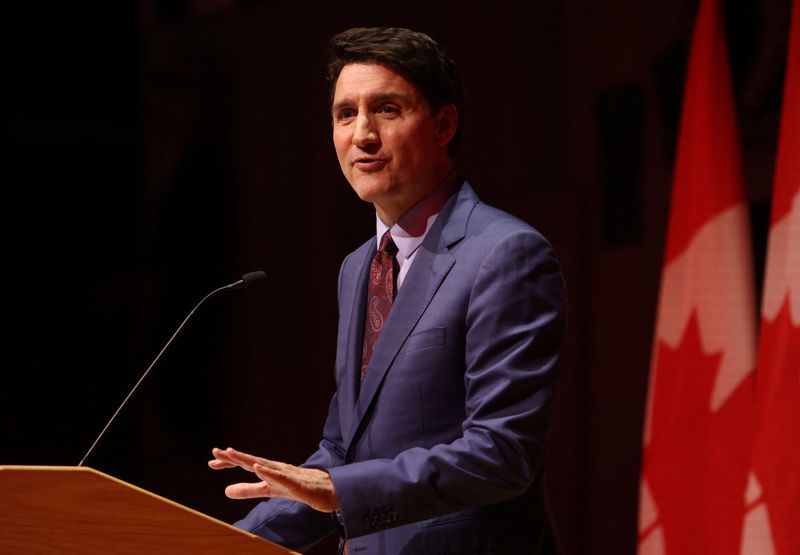By David Ljunggren
OTTAWA (Reuters) -Canadian Prime Minister Justin Trudeau is reflecting on complaints about his leadership from legislators from the ruling Liberal Party who are unhappy that Finance Minister Chrystia Freeland quit, a close ally said on Tuesday.
Another Liberal parliamentarian said separately that Trudeau was "delusional" if he thought he could fight the next election, which is due by Oct. 20 next year. Polls show the Liberals would be crushed by the official opposition Conservatives.
Freeland resigned on Monday amid a policy clash and released a letter savaging Trudeau's leadership, prompting one of the worst crises since he became prime minister in 2015.
Hours later, Trudeau held a special meeting with his parliamentary caucus, which is already unhappy over the party's poor performance in the polls.
"He did say to caucus that he had heard very clearly, and listened carefully, to their concerns and he would reflect on it," new Finance Minister Dominic LeBlanc told the Canadian Broadcasting Corporation.
LeBlanc, one of Trudeau's closest friends, was named finance minister later on Monday.
LeBlanc is also temporarily keeping his previous role as public safety minister and a number of other ministers have more than one job as a result of colleagues' resignations. CBC reported Trudeau would reshuffle his cabinet soon, possibly on Wednesday.
"A number of my caucus colleagues have said publicly that the prime minister is reflecting on Minister Freeland's decision and the feedback he heard yesterday. I respect that he is taking time to reflect," Natural Resources Minister Jonathan Wilkinson told Reuters by phone.
The only public event on Trudeau's calendar for Tuesday is a Liberal Christmas party in the evening. When addressing a party fundraiser on Monday, he made no mention of whether he might step down.
LIBERALS LOSE SPECIAL ELECTION
To underline the party's woes, it badly lost a special election in the western province of British Columbia, provisional results showed.
While Trudeau cannot be forced out by his caucus, he may find it harder to stay in office if enough parliamentarians openly call on him to go. Only a handful have done so publicly but that number is slowly growing.
Veteran Liberal legislator John McKay, who has remained loyal to Trudeau, told CBC the prime minister needed to make a decision about his future sooner rather than later.
"The uncertainty is difficult for everyone," he said.
Trudeau is safe for now, since the only way he can be forced out is if all opposition parties unite against him on a vote of non-confidence. Such a vote could not happen until after the House of Commons elected chamber returns on Jan. 27.
But Liberal legislator Wayne Long, who had previously called on Trudeau to quit, told reporters on Tuesday the prime minister was living in a false reality.
"He is delusional if he thinks we can continue like this ... We're not just taking on water, we're underwater," he said.
The opposition Bloc Quebecois called for an immediate election, saying Canada needed a properly functioning government to deal with the incoming U.S. administration and its threats to impose 25% tariffs on Canadian imports.
"Justin Trudeau has lost the confidence of a sizeable enough portion of his own caucus that it will be impossible for him to implement any meaningful economic strategies for the remainder of this parliament," said Moshe Lander, a senior economics lecturer at Montreal's Concordia University.

A Nanos Research poll released on Tuesday showed the Conservatives have 43% public support, the Liberals have 23% and the smaller left-leaning New Democrats are attracting 20% support. Such a result on Election Day would produce a massive Conservative majority.
In another blow, the traditionally pro-Liberal Toronto Star - the largest circulation newspaper in Canada - ran an editorial saying it was time for Trudeau to leave.
(Additioal reporting by Nia Williams and Saeed Azhar, editing by Caroline Stauffer, Chizu Nomiyama and Rod Nickel)